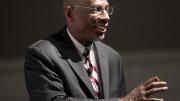Today Geoffrey Canada, Ed.M. ’75, L.H.D. ’01, president and CEO of the nonprofit Harlem Children's Zone, delivered the Harvard Kennedy School’s Graduation Address in JFK Forum, which seemed to be packed with as many world flags as with people sheltering from the threat of rain. He urged the graduates to not only contribute to the unfinished dream of bettering American society inherited from generations before them, but to remember that they can aspire to a higher calling without “needing to take a vow of poverty.” “Some of you better go out and make some money!” he urged to a wave of applause and laughter, as “some folk need to be really rich” in order for others to do good work.
Canada’s own good work was praised by HKS dean David T. Ellwood, who introduced him as a social activist, educator, innovator, book author, and mentor who became involved with HCZ in 1990. Canada, who originally grew up in the poorest congressional district in the United States, the South Bronx, has worked with HCZ in an effort to revitalize the quality of education and to create opportunity for inner-city youth, in order to untie the cycle of generational poverty in his community. The organization contributes to this goal by financially supporting health and pre-school related programs, as well as three public charter schools, with an aim of helping empower parents and guide children from infancy, through high school and college, and on into the job market. The program’s objective, as Dean Ellwood described it, is not that no child is left behind, but that “every child succeeds.” Canada added that the kids in the schools he oversees realize that he’s a star not so much because of the list of accolades he has gathered during his career, but because he has been on the Oprah Winfrey Show. Twice.
Canada described how his commitment to bettering the educational opportunities of the poorest children in America was a vision he inherited from his own childhood experiences and the example set for him by his idols. When he was in elementary school, Rosa Parks refused to give up her seat on a Montgomery bus. When he was in sixth grade, John F. Kennedy became president, a man whom Canada described as standing up for constitutional rights that half the country stood against at the time. And, in 1968, when he was in tenth grade, the visions of a better future that both Robert F. Kennedy and Martin Luther King held were handed over to their successors when they were both assassinated. Canada’s own career and work, is, as he describes it, also nearing its end. But he noted that he—just like those who came before him who also aspired to leave their country better than they found it—has a next generation to rely on.
He extracted a promise from the imminent graduates—some 564 degree candidates, including a member of the cabinet of the European Commission, a senior economist at the International Monetary Fund, and state representatives from Vermont and Massachusetts—to continue to do good work, and to continue to save the children that he has started to help. And he added that, in this promise, and in the promise of their talents and ambitions, the generation embodied by the HKS Class of 2013 might just be “the greatest generation yet.”
With that concluding statement, he received a standing ovation from a crowd filled with proud parents, and from graduates filled with promises to make a better world—and permission to make lots of money.









